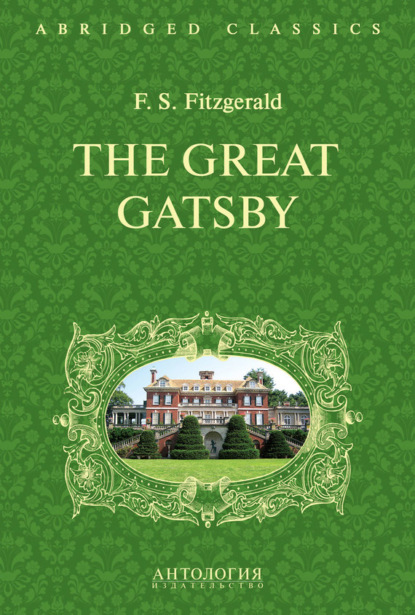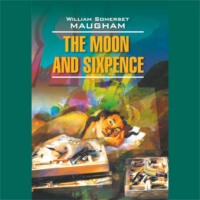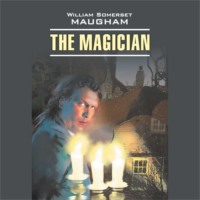
Полная версия
The Painted Veil / Узорный покров
“Do people dance much there?”
“Oh, yes, I think so.”
She wondered whether he told her these things with a motive. He seemed to like her society, but never by a pressure of the hand, by a glance or by a word, did he give the smallest indication that he looked upon her as anything but a girl whom you met and danced with. On the following Sunday he came again to their house. Her father was at home, and he and Walter Fane had a long chat. She asked her father afterwards what they had talked of.
“It appears he works at Hong Kong. The Chief Justice[14] is an old friend of mine. He seems an unusually intelligent young man.”
“It’s not often you like any of my young men, father,” she said.
His kind, tired eyes rested upon her.
“Are you going to marry him by any chance?”
“Certainly not.”
“Is he in love with you?”
“He shows no sign of it.
“Do you like him?”
“I don’t think I do very much. He irritates me a little.”
He was not her type at all. He was short, but thin; dark and clean-shaven, with very regular, clear-cut features. His eyes were almost black, but not large; they were curious, but not very pleasant eyes. With his straight, delicate nose, his fine brow and well-shaped mouth he ought to have been good-looking. But surprisingly enough he was not. His expression was slightly sarcastic and now that Kitty knew him better she realized that she was not quite comfortable with him. He had no cheerfulness.
By the end of the season they had seen a lot of one another, but he had remained as distant and impenetrable as ever. He was not exactly shy with her, but embarrassed. Kitty came to the conclusion that he was not in love with her. She thought he liked her and found her easy to talk to, but when he returned to China in November he would not think of her again.
Then came the announcement of Doris’s engagement to Geoffrey Dennison. Doris, at eighteen, was making quite a suitable marriage, and she was twenty-five and single. Supposing she did not marry at all? Kitty’s heart sank.
XI
But one afternoon when she was walking home from Harrod’s she met Walter Fane. He stopped and talked to her. Then, casually, he asked her if she would walk with him in the Park. She had no particular wish to go home. They strolled along, talking as they always talked, of casual things, and he asked her where she was going for the summer.
“Oh, we always bury ourselves in the country. You see, father is exhausted after the term’s work and we just go to the quietest place we can find.”
Kitty spoke with her tongue in her cheek[15], for she knew quite well that her father had not enough work to tire him and even if he had his convenience would never matter in the choice of a holiday. But a quiet place was a cheap place.
“Don’t you think those chairs look rather inviting?” said Walter suddenly.
She saw two green chairs under a tree on the grass.
“Let us sit in them,” she said.
But when they were seated he seemed to grow strangely distant. He was an odd creature. Suddenly he turned to her. His face was white.
“I want to say something to you.”
She looked at him quickly and she saw that his eyes were filled with a painful anxiety.
“I want to ask you if you’ll marry me.”
“I didn’t expect it at all,” she answered, extremely surprised.
“Didn’t you know I was awfully in love with you?”
“You never showed it.”
“I’m very awkward and clumsy. I always find it more difficult to say the things I mean than the things I don’t.”
Her heart began to beat a little more quickly. She had been proposed too often before, but no one had ever asked her to marry him in a manner which was so strangely tragic.
“It’s very kind of you,” she said, doubtfully.
“I fell in love with you the first time I saw you. I wanted to ask you before, but I could never make myself do it. I didn’t want to lose hope. But now you’re going away and in the autumn I have to go back to China.”
“I’ve never thought of you in that way,” she said helplessly.
He said nothing more. He looked down on the grass gloomily. She was a little frightened, but she was thrilled also.
“You must give me time to think.”
Still he did not say anything. She must talk it over with her mother. She had waited, thinking he would answer, and now, she did not know why, she found it difficult to make a movement. When you sat close to him you saw how good his features were, and how cold his face.
“I don’t know you, I don’t know you at all,” she said tremulously.
He gave her a look. His eyes had a tenderness which she had never seen in them before, but there was something pleading in them, like a dog’s that has been whipped, which slightly annoyed her.
It was certainly the oddest proposal she had ever had. She was not in the least in love with him. She did not know why she hesitated to refuse him at once.
“I’m awfully stupid,” he said. “I want to tell you that I love you more than anything in the world, but I find it so awfully difficult to say.”
Now that was odd too, for inexplicably enough it touched her; he wasn’t really cold, of course, it was his manner that was unfortunate: she liked him at that moment better than she had ever liked him before. Doris was to be married in November. He would be on his way to China then and if she married him she would be with him. It wouldn’t be very nice to be a bridesmaid at Doris’s wedding. She would be glad to escape that. And then Doris as a married woman and herself single! Everyone knew how young Doris was and it would make her seem older. It wouldn’t be a very good marriage for her, but it was a marriage, and the fact that she would live in China made it easier. She was afraid of her mother’s bitter tongue. Why all the girls who had come out with her were married long ago and most of them had children; she was tired of going to see them and smiling at their babies. Walter Fane offered her a new life. She turned to him.
“When would you want to marry me?”
He gave a sudden gasp of delight, and his white cheeks flushed.
“Now. At once. As soon as possible. We’d go to Italy for our honeymoon. August and September.”
That would save her from spending the summer in the country with her father and mother. She imagined the announcement in the Morning Post that the bridegroom has to return to the East, so the wedding would take place at once. For the moment at least Doris would be in the background and when Doris’s much grander wedding took place she would be far away.
She stretched out her hand.
“I think I like you very much. You must give me time to get used to you.”
“Then it’s yes?” he interrupted.
“I suppose so.”
XII
She knew him very little then, and now, though they had been married for nearly two years, she knew him just a little more. At first she had been touched by his kindness and flattered, though surprised, by his passion. He was extremely considerate; he was very attentive to her comfort. He was constantly giving her little presents. And he was always exceedingly polite. He rose to his feet when she entered a room, he gave her his hand to help her out of a car, if he chanced to meet her in the street he took off his hat, he opened the door for her when she left a room, he never came into her bedroom or her boudoir without a knock. He treated her not as Kitty had seen most men treat their wives. It was pleasing and yet a trifle comic. Their relations didn’t draw her closer to him. He was passionate then, fierce, oddly hysterical too, and sentimental.
He was really emotional. His self-control was due to shyness or to long training, she did not know which. When there was a party and every one started singing Walter could never make himself join in. He sat there smiling to show that he was pleased and amused, but his smile was forced: it was more like a sarcastic grin, and you could not help feeling that he thought all those people enjoying themselves a pack of fools. He could not make himself play the round games which Kitty with her high spirits liked so much. On their journey out to China he had absolutely refused to put on fancy dress when everyone else was wearing it.
Kitty was lively; she was willing to chatter all day long and she laughed easily. His silence disconcerted her. If it was raining and she said: “It’s raining cats and dogs,” she expected him something to say. But he remained silent. Sometimes it was awful.
“I said it was raining cats and dogs,” she repeated.
“I heard you,” he answered, with his affectionate smile.
It showed that he had not meant to be offensive. He did not speak because he had nothing to say. But if nobody spoke unless he had something to say, Kitty reflected, with a smile, the human race would very soon lose the use of speech.
XIII
The fact was, of course, that he had no charm. That was why he was not popular, and she had not been long in Hong Kong before she discovered that he was not. She remained very vague about his work. She realized that to be the government bacteriologist was no great importance. He didn’t discuss that part of his life with her. Because she was willing to be interested in anything at first she had asked him about it. He put her off with a jest.
“It’s very dull and technical,” he said on another occasion. “And it’s extremely underpaid.”
He was very reserved. All she knew about his birth, his education, and his life before he met her, she had learnt by direct questioning. It was odd, the only thing that seemed to annoy him was a question. She understood that he did not care to reply not because he had anything to hide from her, but merely from a natural secretiveness. It bored him to talk about himself. It made him shy and uncomfortable. He did not know how to be open. He was fond of reading, but he read books which seemed to Kitty very dull. He never relaxed. He was fond of only two games: tennis and bridge.
She wondered why he had ever fallen in love with her. And yet it was quite certain that he loved her madly. He would do anything in the world to please her. He was like wax in her hands. She supposed he was clever, everyone seemed to think he was, but except very occasionally when he was with two or three people he liked and was in the mood, she had never found him entertaining. He did not precisely bore her, he left her indifferent.
XIV
Though Kitty had met his wife at various tea-parties she had been some weeks in Hong Kong before she saw Charles Townsend. She was introduced to him only when with her husband she went to dine at his house. Charles Townsend was Assistant Colonial Secretary and Kitty didn’t want to allow him to use her with the arrogance which she saw in Mrs. Townsend. The room in which they were received was spacious. It was a large party. They were the last to come and as they entered Chinese servants in uniform were handing round cocktails and olives. Mrs. Townsend greeted them in her casual fashion and looking at a list told Walter whom he was to take in to dinner.
Kitty saw a tall and very handsome man approaching them.
“This is my husband.”
“I have the privilege of sitting next to you,” he said.
She immediately felt at ease and the sense of hostility vanished from her bosom. Though his eyes were smiling she had seen in them a quick look of surprise. She understood it perfectly.
“I won’t be able to eat any dinner,” he said, “and if I know Dorothy the dinner’s damned good”.
“Why not?”
“Some one really had to warn me.”
“What about?”
“No one said a word. I didn’t know that I was going to meet a real beauty.”
“Now what should I say to that?”
“Nothing. Leave me to do the talking. And I’ll say it over and over again.”
When they were sitting side by side at table he told her that he had known Walter Fane ever since he came to the Colony.
“We play bridge together. He’s the best bridge player at the Club.”
She told Walter on the way home.
“That’s not saying very much, you know.”
“How does he play?”
“Not badly, but when he has bad cards he goes all to pieces.”
“Does he play as well as you?”
“I have no illusions about my play. I should describe myself as a very good player in the second class. Townsend thinks he’s in the first. He isn’t.”
“Don’t you like him?”
“I neither like him nor dislike him. I believe he’s not bad at his job and everyone says he’s a good sportsman. He doesn’t very much interest me.”
It was not the first time that Walter’s moderation had exasperated her. She asked herself why it was necessary to be so prudent: you either liked people or you didn’t. She had liked Charles Townsend very much. And she had not expected to. He was probably the most popular man in the Colony. It was supposed that the Colonial Secretary would retire soon and everyone hoped that Townsend would succeed him. He played tennis and polo and golf. He kept racing ponies. He was always ready to help. He put on no airs.[16] Kitty did not know why she had thought that he was snobbish: she had been extremely silly; you couldn’t accuse him of that.
She had enjoyed her evening. They had talked of the theatres in London, and of all the things she knew about; and later, when the men came into the drawing-room after dinner, he had strolled over and sat beside her again. Of course he had charm. That was what made him so pleasant.
He was tall, six foot two at least, she thought, and he had a beautiful figure. He was well-dressed, the best-dressed man in the room, and he wore his clothes well. His face was deeply sunburned, but the sun had not taken the healthy colour from his cheeks. She liked the little curly moustache which did not hide his full red lips. He had short black hair. But of course his eyes, under thick, bushy eyebrows, were his best feature: they were so very blue, and they had a laughing tenderness. No man with those blue eyes could hurt any one.
She knew that she had made an impression on him. When she shook hands with him to say good-bye, he gave her hand a pressure that she could not mistake.
“I hope we’ll see you again soon,” he said casually, but his eyes gave his words a meaning which she could not fail to understand.
“Hong Kong is very small, isn’t it?” she said.
XV
Nobody could think then that within three months they would be on such terms[17]. He had told her since that he was crazy about her on that first evening. She was the most beautiful thing he had ever seen. She knew that he was in love with her before he told her, and a little frightened she kept him at a distance. It was difficult. She was afraid to let him kiss her, for the thought of his arms about her made her heart beat so fast. She had never been in love before. It was wonderful. And now that she knew what love was she felt a sudden sympathy for the love that Walter had for her. She teased him, playfully, and saw that he enjoyed it. She had been perhaps a little afraid of him, but now she had more confidence. He was surprised and pleased. One of these days, she thought, he would become quite human.
And when Charlie became her lover the situation between herself and Walter seemed absolutely absurd. She could hardly look at him, so serious and self-controlled, without laughing. She was too happy to feel unkindly towards him. She had hesitated some time before the final step, not because she did not want to give way to Charlie’s passion, her own was equal to his, but because her upbringing and all the conventions of her life limited her. The final act was due to accident; neither of them had seen the opportunity till it was face to face with them.
XVI
Her happiness, sometimes almost more than she could bear, renewed her beauty. Her starry eyes gained a more significant expression; her skin was dazzling. She looked eighteen once more. She was at the height of her glowing loveliness. It was impossible not to remark it and her women friends asked her if she was going to have a baby.
They managed their intrigue with skill. They could not meet often alone, sometimes in the curio shop, now and then after lunch in her house when no one was about; but she saw him a lot here and there.
She worshipped him. He was splendid. In tennis clothes he looked just like a boy. Of course he was proud of his figure: it was the best figure she had ever seen. He never ate bread or potatoes or butter. And he did a lot of exercise. She liked the care he took of his hands; he was manicured once a week. He was a wonderful athlete and the year before he had won the local tennis championship. Certainly he was the best dancer she had ever danced with; it was a dream to dance with him. No one would think he was forty. She told him she did not believe it.
“I believe it’s all bluff and you’re really twenty-five.”
He laughed. He was well pleased.
“Oh, my dear, I have a son of fifteen. I’m middle-aged. In another two or three years I’ll just be a fat old man.”
“You’ll be adorable when you’re a hundred.”
She did not believe there was anything he could not do: he was very clever at his work too and she shared his pleasure when he told her that the Governor had particularly congratulated him on the way he had done some difficult job.
Oh, how she wished that she were his wife rather than Walter’s!
XVII
Of course it was not certain yet that Walter knew the truth, but if he did, well, in the end it would be the best thing for all of them. At first she had put up with seeing Charlie only secretly; but time had increased her passion and for a while now she had been increasingly impatient of the obstacles which prevented them from being always together. He had told her so often that he cursed his position which forced him to be so cautious, the ties which bound him, and the ties which bound her. She saw his point of view; no one wanted a scandal, and of course it required a lot of thinking over before you changed the course of your life.
It was not as though any one would suffer very much. She knew exactly what his relations were with his wife. She was a cold woman and there had been no love between them for years. It was habit that held them together, convenience, and of course the children. It was easier for Charlie than for her: Walter loved her; but after all, he was absorbed in his work; and a man always had his club; he might be upset at first, but he would get over it; there was no reason why he should not marry someone else.
She wondered, why a little while before she had been terrified at the thought that Walter had caught them. Of course it was startling to see the handle of the door slowly turn. But after all they knew the worst that Walter could do, and they were ready for it.
Walter was a gentleman, and he loved her; he would allow her to divorce him. They had made a mistake and the lucky thing was that they had found it out before it was too late. She made up her mind exactly what she was going to say to him. She would be kind, smiling, and firm. There was no need for them to quarrel. Later on she would always be glad to see him. She hoped honestly that the two years they had spent together would remain with him as a priceless memory.
“I don’t suppose Dorothy Townsend will mind divorcing Charlie a bit,” she thought. “Now the youngest boy is going back to England it will be much nicer for her to be in England too. There’s absolutely nothing for her to do in Hong Kong. She’ll be able to spend all the holidays with her boys. And then she’s got her father and mother in England.”
It was all very simple and everything could be managed without scandal. And then she and Charlie could marry. They would be very happy.
Sooner or later Walter must come home and her heart beat fast at the thought of meeting him; it was strange that he had gone away that afternoon without saying a word to her. Once more she repeated what she would say to him. What was the good of making a scene? She was very sorry, she didn’t want to cause him pain, but she couldn’t help it if she didn’t love him. It was no good pretending and it was always better to tell the truth. She hoped he wouldn’t be unhappy, but they had made a mistake and the only sensible thing was to acknowledge it. She would always think kindly of him.
But even as she said this to herself she was frightened. And because she was frightened she grew angry with him. Oh, how he’d bored her, bored her, bored her! He thought himself so much better than anyone else; he had no sense of humour; she hated his arrogance, his coldness, and his self-control. It was easy to be self-controlled when you were interested in nothing and nobody but yourself. He was disgusting to her. She hated to let him kiss her. He danced awfully, he couldn’t play or sing, he couldn’t play polo and his tennis was no better than anybody else’s. Bridge? Who cared about bridge?
Kitty worked herself up[18]. Let him dare to reproach her. All that had happened was his own fault. She was thankful that he knew the truth at last. She hated him and wished never to see him again. Yes, she was thankful that it was all over. Why couldn’t he leave her alone?
She heard the car stop at the gate of their garden. He was coming up the stairs.
XVIII
He came into the room: her heart was beating wildly and her hands were shaking; it was lucky that she lay on the sofa. She was holding an open book as though she had been reading. He stood for an instant on the threshold and their eyes met. Her heart sank. His face was deathly pale; she had seen it like that once before, when they sat together in the Park and he asked her to marry him. He knew everything.
“You’re back early,” she remarked.
Her lips trembled so that she could hardly say the words. She was terrified. She was afraid she would faint.
“I think it’s about the usual time.”
His voice sounded strange to her. She wondered if he saw that she was shaking. He dropped his eyes.
“I’m just going to dress.”
He left the room. For two or three minutes she could not move. Then she got up not knowing if her legs would support her. With one hand on the wall she went to her room. She put on a tea-gown and when she went back into her boudoir (they only used the drawing-room when there was a party) he was standing at a table looking at the pictures of a magazine. She had to force herself to enter.
“Shall we go down? Dinner is ready,” he said.
“Have I kept you waiting?”
It was dreadful that she could not control the trembling of her lips.
When was he going to speak?
They sat down and for a moment there was silence between them. Then he said something unimportant.
She looked at him now and saw that his eyes were fixed on his plate. He made another observation, equally trivial, about a tennis tournament. His voice as a rule was agreeable, but now he spoke on one note. It was strangely unnatural. And all the time his eyes were directed to his plate, or the table, or to a picture on the wall. She realized that he could not bear to look at her.
“Shall we go upstairs?” he said when dinner was finished.
“If you like.”
She rose and he held open the door for her. His eyes were cast down as she passed him. When they reached the sitting-room he took up the illustrated paper once more.
“Is this a new issue? I don’t think I’ve seen it.”
“I don’t know. I haven’t noticed.”
It had been lying about for a fortnight and she knew that he had looked it through and through. He took it and sat down. She lay again on the sofa and took her book. As a rule in the evening, when they were alone, they played cards. He was sitting in an armchair, and his attention seemed absorbed by the illustration he was looking at. He did not turn the page. She tried to read, but she could not see the print before her eyes. Her head began to ache violently. When would he speak?
They sat in silence for an hour. She was afraid to make the smallest gesture or the smallest sound. He sat quite still, in that same position, and stared with those wide, immobile eyes of his at the picture. His stillness was strangely threatening. It gave Kitty the feeling of a wild beast prepared to spring.
When suddenly he stood up she started. She clenched her hands and she felt herself grow pale. Now!
“I have some work to do,” he said in that quiet, toneless voice. “If you don’t mind I’ll go into my study. I think you’ll be asleep by the time I’ve finished.”












